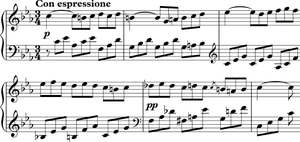

Problems playing this file? See media help.

4 and
4 Play
4 and Play
4




Alberti bass is a particular kind of accompaniment figure in music, often used in the Classical era, and sometimes the Romantic era. It was named after Domenico Alberti (1710–1740/46), who used it extensively, although he was not the first to use it.
Alberti bass is a kind of broken chord or arpeggiated accompaniment, where the notes of the chord are presented in the order lowest, highest, middle, highest. This pattern is then repeated several times throughout the music. The broken chord pattern helps to create a smooth, sustained, flowing sound on the piano. "Chords of harmony broken up into short patterns. Steady bass patterns in orchestral music which give the rhythmic drive to Classical music, compensating for the energetic drive of the Baroque basso continuo line."
Alberti bass is usually found in the left hand of pieces for keyboard instruments, especially for Mozart's piano pieces. However, it is also found in pieces for other instruments. It has been described as "a true tolerable monotony," and as "perhaps the most overworked fixture of eighteenth-century music."
Well-known examples of Alberti bass include the beginning of Mozart's Piano Sonata, K 545, and the third movement of Beethoven's Moonlight Sonata. A famous example from 20th-century American popular music is the bass guitar part of the 1962 surf rock standard "Pipeline", by The Chantays. Alberti bass is also used in the ending theme of Nintendo's Super Mario Bros. 2.
Notes
- Given as an example in sources including
References
- Palmer, Willard A.; Manus, Morton; and Lethco, Amanda Vick (2005). Alfred's Basic Adult Piano Course - Theory Book 3, p.12. Alfred Music. ISBN 9781457407482.
- Magrath, Jane (1988). Masterwork Practice & Performance, Level 3, p.40. Alfred Music. ISBN 9781457410819.
- ^ Goldman, Richard Franko (1965). Harmony in Western Music, p.20-1 & 174. Barrie & Jenkins. ISBN 0-214-66680-8. "Examples of the Alberti bass...will be found...in the well-known C-major Sonata of Mozart (K. 545)."
- Benward, Bruce and Saker, Marylin (2009). Music in Theory and Practice, Vol. II, p.122-3. McGraw Hill. 8th edition. ISBN 978-0-07-310188-0.
- ^ "Alberti Bass." Baker's Student Encyclopedia of Music. Ed. Laura Kuhn. Schirmer-Thomson Gale, 1999. ISBN 9780028654157.
- Hurry, Pam; Phillips, Mark; and Richards, Mark (2001). Heinemann Advanced Music, p.48. Heinemann. ISBN 9780435812584.
- Aschenbrenner, L. (2012). The Concept of Coherence in Art, p.200. Springer Science & Business Media. ISBN 9789400953277.
- ^ Bernstein, Leonard (2007). The Infinite Variety of Music, p.51. Amadeus Press. ISBN 9781574674026. "But over and over again we can find Mozart using this figuration in such a way that it is transformed by the sheer beauty of his melodic invention above it."
- Rink, John (1984). Musical Performance: A Guide to Understanding. Cambridge University Press. p. 40. ISBN 9780521788625.
The first two bars of Mozart's Piano Sonata in C major K. 545... The passage consists of an Alberti-bass accompaniment supporting... melody.
- ^ Overly, Mike (March 25, 2015). "Surfin’ With Mozart", 12ToneMusic.WordPress.com. Accessed: 21 July 2019.
- Abjorensen, Norman (2017). Basslines with broken chords are also important in Boogie Woogie piano music. For instance Yancey Special by Meade Lux Lewis uses a typical Alberti bass. id=6ZyrDgAAQBAJ&pg=PA93&dq=the+chantays+pipeline+%22alberti+bass%22&hl=en&sa=X&ved=0ahUKEwjhr5mvl8fjAhUOB3wKHeMFA4MQ6AEIKjAA#v=onepage&q=the%20chantays%20pipeline%20%22alberti%20bass%22&f=false Historical Dictionary of Popular Music, p.93. Rowman & Littlefield. ISBN 9781538102152.
- "Ending"
- "Ending Theme - Super Mario Bros. 2"
| Accompaniment | ||
|---|---|---|
| Musical instruments | ||
| Techniques and styles | ||
| Music ensembles | ||
This music-related article is a stub. You can help Misplaced Pages by expanding it. |